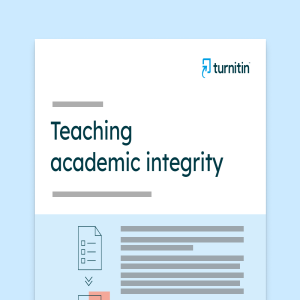Sound familiar? As an instructor confronting a student with a suspected case of plagiarism, dismissing such a claim may seem obviously appropriate, but do we as instructors really know whether a student understands the concepts of ethical writing practices when they enter their major area of study? How can we be sure? And, who bears the responsibility for developing this skill: the academic integrity department, the writing educators, the student?
As Associate Professors at Ashford University in San Diego, California, repeated comments such as that above encouraged us to think outside the box, challenging our own responsibility in the process. And as we began to investigate our concerns, evidence of support came to light.
Although responsibility for plagiarism ultimately rests with the author, particularly with regard to blatant errors such as copy paste and mosaic plagiarism (Turnitin, 2012), changing student demographics and learning modalities render it plausible that some may in fact be unaware of proper procedures for citing sources, paraphrasing, and other necessary skills for college-level writing (Power, 2009; Rosser-Majors & Anderson, 2018b).
The following statement by a doctoral student in her dissertation neatly expresses this view:
The fact that I was writing papers in every class and doing well by them grade-wise told me that obviously I had no academic integrity problem. No one was telling me otherwise, and yet, I did not know. No one bothered to determine if I did know. Unfortunately, this mode of thinking is common to all students; they don’t know what they don’t know. How are students supposed to know what they do not know, especially when they believe, as I did, that what they are doing is totally correct? (Stout, 2013, p. 5-6).
Hence, although instructors may feel inclined to focus on their own discipline and content, assuming that writing skills are the purview of another department, preparing students to effectively apply the content in the real-world includes the advancement of their academic writing, as students will better learn and convey their knowledge of any field if they become successful communicators. So, despite our varied backgrounds, we as educators share a common interest in helping students develop these skills. In this piece, we will share our experience in application to taking ownership of the mitigation of the “spreading infection” of plagiarism amongst undergraduate students (Ziman, 2005, p. 1353).
As online faculty who work with many non-traditional and transfer students, we realized students entering our program may indeed lack the foundational writing skills we expected them to have (Rosser-Majors, 2018b). Students entering the BA in Psychology program were being far too often cited for plagiarism, which impacted success, persistence and ultimately, retention.
In an effort to address this issue, we decided to take ownership of our students’ development and implemented a writing exercise fused with the core content aimed at developing ethical writing practices. Specifically, we focused on paraphrasing, or the expression of another’s thoughts using one’s own words, which is a necessary skill for students to acquire as they develop their own academic voice.
Our results have exceeded our expectations, demonstrating significant reductions (89.6%) in reported cases of academic dishonesty (Anderson & Rosser, 2018; Rosser-Majors & Anderson, 2018a; Rosser-Majors & Anderson, 2018b). Our strategy is applicable to a variety of modalities and can be tailored to any content. The following summarizes our considerations for a content infused writing exercise within an introductory psychology course:
- Provide information and resources. We begin by defining plagiarism, introducing students to the varied practices that may be construed as dishonest (Turnitin, 2012). In addition, we provide resources outlining strategies for academic writing, such as paraphrasing and summarizing, as well as proper citation practices.
- Practice, practice, practice! Next, we direct students to paraphrase a passage from a scholarly article. This could be an article of the student’s choice (with the added benefit of sending the student to the library), or it could be a content-based passage selected by the instructor and constant across the class. While it stands alone in our course, the task itself could also be integrated into an existing course assignment. Additionally, incorporation of such an exercise into an upper-level course could focus on more advanced skills, such as synthesis of research.
- Encourage reflection. Finally, we ask students to reflect on the ethical responsibilities of a student and as a professional (relevant to their journey as a student and their career aspirations), identifying consequences of plagiarism—even when unintentional. This portion of the exercise already allows for a multitude of discipline-specific insights, given the wide variety of majors students in introductory-level classes may be pursuing, but it could be tailored toward a particular industry.
This targeted attempt to explain academic writing and allow students an opportunity to demonstrate their skills allows individual instructors an opportunity to identify and address common errors, ensuring that all students are entering the discipline with foundational skills necessary for success. We recommend early introduction in a program and scaffolded enforcement and reinforcement throughout the academic experience as a means to assist students in mastery of their academic writing skills. Our exploratory research substantiates the view that the entire academic institution—including instructors—should work together in a concerted effort to develop effective scholars and learners.
Dr. Stephanie L. Anderson is an Associate Professor in the School of Health, Human Services, and Science at Ashford University. Dr. Michelle Rosser-Majors is an Associate Professor and the Program Chair for the Bachelor of Arts in Psychology in the College of Health, Human Services, and Science at Ashford University.
-------
ReferencesAnderson, S. and Rosser-Majors, M. L. (2018). The case of the plagiarized paragraph: A practical exercise to develop an academic voice. In Integrating Writing into the College Classroom: Strategies for Promoting Student Skills. Society for the Teaching of Psychology: APA.
Choo, T. E., & Paull, M. (2013). Reducing the prevalence of plagiarism: A model for staff, students and universities. Issues in Educational Research, 23(2), 283-298.
Johnson, Genevieve M. (2015). On-campus and fully-online university students: Comparing demographics, digital technology use, and learning characteristics, Journal of University Teaching & Learning Practice, 12(1). 4. Retrieved from: http://ro.uow.edu.au/jutlp/vol12/iss1/4
Lederman, D. (2013). Growth for online learning. Inside Higher Ed. Retrieved from http://www.insidehighered.com/news/2013/01/08/survey-finds-onlineenrollments- slow-continue-grow.
Power, L. G. (2009). University students’ perceptions of plagiarism. The Journal of Higher Education, 80(6), 643-662.
Rosser-Majors, M. and Anderson, S. (2018a). Integrity awareness: Utilizing early program courses for successful writing development. International Conference for Academic Integrity: Richmond, VA.
Rosser-Majors, M. and Anderson, S. (2018b). Innovative integration: Developing writing ethics and values in higher education. EDULEARN18 Proceedings. Retrieved from https://iated.org/edulearn/publications
Stout, D. (2013). Teaching students about plagiarism: What it looks like and how it is measured. Dissertations. Retrieved from http://scholarworks.wmich.edu/dissertations/172
Turnitin. (2012). The plagiarism spectrum: Tagging 10 types of unoriginal work. Retrieved from http://www.turnitin.com/assets/en_us/media/plagiarism_spectrum.php
Ziman, J. (2005). Plagiarism: a spreading infection. Current Science, 88(9), 1353-1354.






